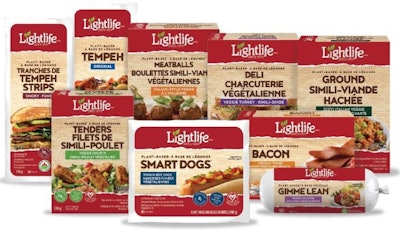
Maple Leaf Foods CEO Michael H. McCain says he is “positive” the company can grow its plant-based protein business into a CA$3 billion (US$2.24 billion) business by 2029.
The Canadian company, previously primarily known as a meat and poultry company, diversified and entered the plant-based protein sector in 2017 with the acquisition of Lightlife Foods. Later that year, the company announced plans to acquire another plant-based protein company, Field Roast Grain Meat Co.
About a year later, Maple Leaf Foods launched its subsidiary, Greenleaf Foods, to support its Field Roast and Lightlife brands.
Speaking during a quarterly earnings call on February 27, McCain explained the company’s growth ambitions, and why he believes those ambitions are attainable.
“We’re positive that we can build this into a CA$3 billion business by 2029, which means capturing a conservative, low-double-digit percentage share of an estimated CA$25 billion market in that time frame,” McCain said.
He said that growth goal is based on five key tenets:
- Maple Leaf Foods has a 100-year brand history of depth and innovation in traditional protein
- The company possesses the proprietary data necessary to drive innovation, marketing and activation
- The company has the financial resources and the commitment to build a sustainable advantage in the plant-based category
- Maple Leaf Foods already owns two plant-based protein brands (Field Roast and Lightlife) today, which are category leaders
- The company presently has wide distribution and leading shares across multiple plant-based sub-categories
McCain said that in the past, “new, destructive food categories,” such as plant-based milk, Greek yogurt, and energy drinks have followed a predictable path, moving from early adoption to takeoff to maturity over a period of five or more years. Plant-based proteins are already partway down that path, he added.
“Plant-based protein is currently, what we would describe, in the takeoff phase, where household penetration builds as mass market adoption becomes the focus and mass market outlets such as grocery stores become the primary sales channel,” he said.
Maple Leaf Foods, within the past year, has rolled out new innovative products and have innovated to improve the products’ taste and texture. He also has optimism about the company’s future in plant-based protein as the company’s products are currently available in about 12,000 retail locations in North America.
To support its growth in the alternative protein category, Maple Leaf Foods is in the process of building a new plant in Shelbyville, Indiana. It was revealed during the earnings call that construction of the Indiana plant is expected to be completed by the end of 2022.


















